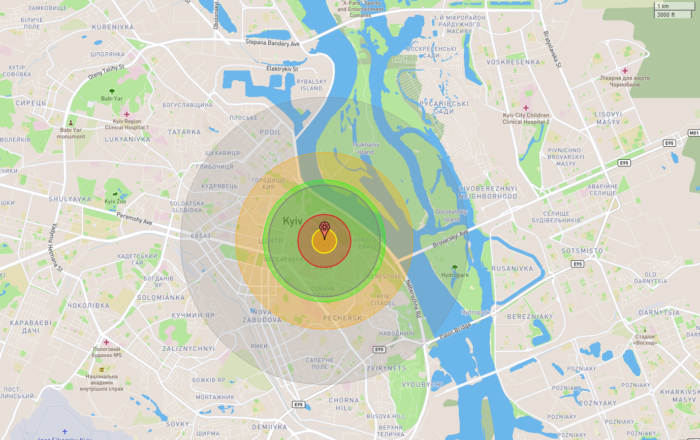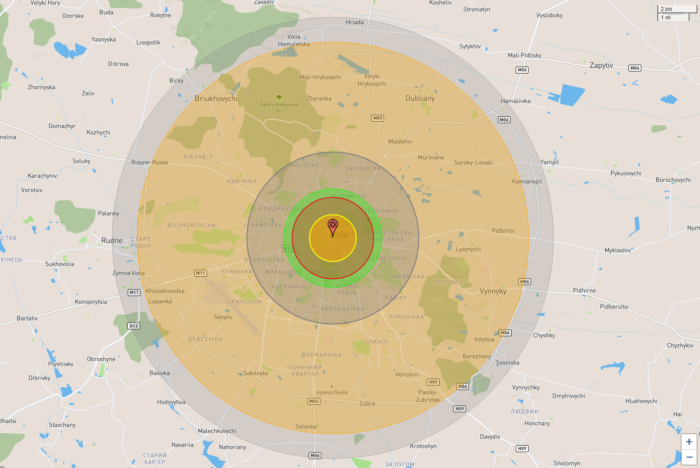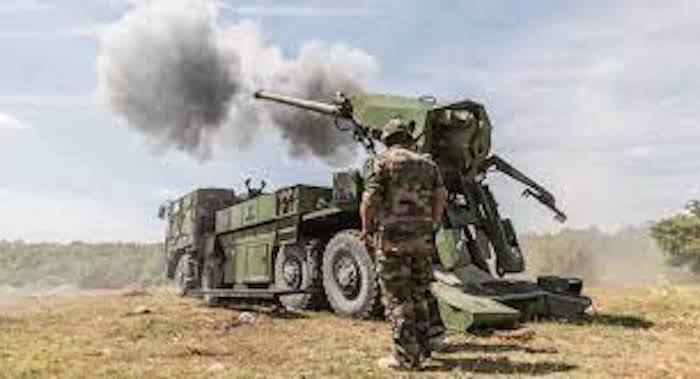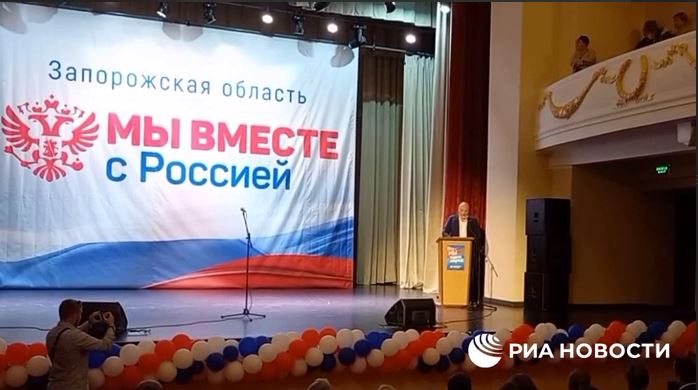Officially, the US asserts that there is no evidence that Russia is preparing to use nuclear weapons. Press secretary Brig. Gen. Pat Ryder stated that the Pentagon does not "assess that President Putin has made a decision to use nuclear weapons at this time."
Authorities in Ukraine, too, believe the possibility of a nuclear strike is low. They claim it is primarily a Kremlin blackmail tactic that aims to scare Europeans and Ukrainians.
Nonetheless, Ukraine's National Security and Defense Council has published official instructions on what to do in the event of a nuclear attack. The instructions guide Ukrainians on how to prepare for any scenario.
A fraction of Ukrainians began preparing for the nuclear threat. The public has already started purchasing necessary gas masks, potassium iodide, substitutes for chemical suits, and so on. Meanwhile, several media outlets even modeled possible nuclear strikes on Ukrainian cities, describing potential outcomes and action algorithms.
However, the overall mood of Ukrainians changed little due to Putin's nuclear hints. Similarly, little did life change in relatively peaceful cities in the country's rear. The war there was limited to missile attacks, like the most recent massive one on 10 October.

Professor of War Studies Lawrence Freedman says that a Russian nuclear strike remains unlikely because Putin successfully uses the threat of a nuclear strike to deter the West from sending the most advanced weapons to Ukraine and directly joining the Ukrainian side in the war. It would come to an end should Russia use nuclear weapons in Ukraine. And if it does, the West's response will depend on the location and scale of the strike. Subsequently, a military response takes place in the event of a serious attack.
EP: The discussion of a possible Russian nuclear strike is heating up. The US stated they sent a clear message to Moscow. They signaled that there would be a response but did not elaborate. So, in your opinion, what should their response be, and what message should be sent to Moscow?
I think it is difficult to describe a response because we do not actually know how, if at all, Russia will use nuclear weapons. It could be a demonstration shot in the Black Sea or an attempt to turn the tide of the current battle. Russian nuclear strike would mean using nuclear weapons over territory they have now claimed for themselves or a strategic attack, a sense attack on a city like Kyiv. Each of those would generate a distinct response.
- Using nuclear weapons to strike Russian targets -- experts consider this scenario almost unrealistic. Recently, French President Macron had stated that France, also a nuclear nation, would not respond in kind if Russia attacks Ukraine with nukes.
- Using non-nuclear means to strike Russian targets, employing US missiles launched from US military facilities; possibly, with the use of aviation. This scenario is so far unlikely in light of the Biden administration's reluctance to do anything that would be perceived by Russia as entering the conflict.
- Non-military methods such as diplomatic and economic isolation or military assistance to Russia's adversaries without US intervention, such as a trade embargo. This scenario has been named as most likely.
However, on 12 October, a statement from a senior NATO official tilted the scales in favor of option #2 a bit more. The official was quoted as saying that Russia nuking Ukraine would almost certainly trigger a “physical response” from Ukraine's allies and potentially from NATO.
And I think the best way to deal with this is not to engage in a detailed discussion, especially with Putin, about something as horrendous and counterproductive as what nuclear use would entail. In other words, to simply state, as the American National Security Adviser, Jake Sullivan did, that the response would be catastrophic.
To me, the basic point about nuclear use is that it doesn't help Putin win. It's awful to happen, but it doesn't help him win. And I think this message is just as important as saying there will be retaliation.
EP: The US claims they have no evidence of Russia's preparations for the actual strike. Various speculations are circulating, especially in Ukrainian media. In particular, Western intelligence will know hours or days before the strike. They also will warn Ukrainians to prepare and seek shelter. As an expert, could you please elaborate on how this works and when intelligence can know something?
It depends on the type of systems Russia intends to use. Presumably, it's their shorter-range, lower-yield systems. One will have to remove the weapons from storage, attach them to missiles, and then prepare for launch, among other steps. Intelligence can overlook this, but they will likely pick it up.
Let's say they use ballistic missiles or Caliber cruise missiles. Russia has already been using them with conventional warheads against Ukraine. Of course, Ukrainians have destroyed some of them. So, if you are looking from a Russian perspective, they must find systems they haven't used before. Russia has not tested those systems in these roles yet. Many systems they've been stockpiling have not worked as they should and have proven to have technical issues.
Suppose Russia intends to use nuclear weapons to influence the battlefield. In that case, there may not be a large concentration of Ukrainian forces, or Ukrainian and Russian forces may be quite close to each other.
The point is that there are opportunities for intelligence to pick up on this when you start looking at the practicalities first. You can't be sure they will, but the opportunities are there.
Second, using nuclear weapons is not a simple thing to do. In some ways, launching an intercontinental ballistic missile is more straightforward than aiming one of these weapons at a strategic location on the battlefield in the hopes that it will detonate at the right place.
[If Russia will use nuclear weapons], it won't make much of a difference [on the battlefield]. Still, they have broken this taboo, the international community is in an uproar, China has now stated that it strongly opposes such a move, and Russians gain nothing. I think it's important for Russia to focus on the challenges it must overcome if it wants to move in that direction.
If it were aimed at Kyiv, Kharkiv, Lviv, or any other Ukrainian city, a warning would be issued [from the West] because Russians would have to use different systems.
The radius of potential destruction is dependent on the bomb's capacity. It ranges from 1 to 100 kilotons for tactical nuclear weapons and up to 800 kilotons for strategic weapons.
In any case, the level of destruction is horrifying. For example, if the 25-kiloton bomb detonated in the Kyiv city center, it would completely destroy everything within a radius of 640 meters (red circle). Additionally, partial destruction would occur within a radius of 3.5 kilometers (outer grey circle). This nuclear explosion could kill tens of thousands of civilians.

Suppose Russia dropped the most powerful 800-kiloton bomb on the city of Lviv in western Ukraine. The bomb would completely erase the city with a UNESCO historical heritage city center and 1 million residents. The consequences would be especially harrowing due to the city's dense planning and population. Such a nuclear strike would raze everything within a radius of 3 kilometers. Simultaneously, the partial destruction would extend beyond a radius of 10 kilometers, also targeting suburbs and neighboring villages.

EP: Ukrainian officials claim that this is primarily psychological warfare designed by Russians. This warfare focuses not only on intimidating Ukrainians but also the Western public. We see that it partially works. How should we respond to Russian statements?
The important thing is it's impractical for Russia, retaliation issues aside.
Nuclear deterrence is working well for Russians. That's why NATO countries are not directly involved in fighting alongside Ukraine. That's why Biden is concerned about providing systems capable of striking deep into Russian territory.
Putin jeopardizes himself by employing nuclear weapons. He loses the deterrent effect he already has because all bets are off at that point. Currently, there is no direct threat to Russian territory. Additionally, Ukraine is not yet preparing a march on Moscow.
I think it's important to recognize that Russia already uses nuclear weapons in this conflict. They serve a deterrent role for Putin. That is jeopardized as soon as you actually use them. If he had broken the taboo, I think there would be a solid conventional response. Such a response could be just as bad for Russia.
EP: The UK is also a nuclear power with its deterrence and response policy.
Obviously, if this is a direct nuclear strike against the UK, then the UK may well respond with a direct nuclear strike against Russia. However, I don't think that's very likely.
Essentially, the UK and other NATO countries support the US policy of respecting the sort of legitimate Russian red lines -- red lines that one could take seriously -- while not becoming too distracted by a slight possibility when the main story at the moment is the disarray in the Russian army.
The Ukrainian forces are currently performing well on the battlefield. The most likely scenario is that they will continue to perform well, and Putin won't be able to counteract this.
Read also:
- Russian nuclear strike would almost certainly draw "physical response," NATO official said
- Is Putin mentally ill? Would he press the nuclear button? Interview with top Ukrainian psychoanalyst
- Russia kidnapped deputy head of Zaporizhzhia Nuclear Power Plant – Energoatom
- Zelenskyy is convinced Putin "will not save his life" if Russia uses nuclear weapons
- Nuclear attack threats is another stage of information terrorism by Russia, Ukraine's Center for Countering Disinformation says
- "I don't see Putin using nuclear weapons" – military strategist Lawrence Freedman
- US hasn't yet seen any action indicating Russia contemplating nuclear attack – US State Sec Blinken
- Garry Kasparov: If Putin's nuclear blackmail works against Ukraine, he will use it next in Poland or Estonia
- Ukrainian "people's" satellite helps nab Russian war equipment disguised in forests
- Four reasons why the US should designate Russia as a state sponsor of terrorism
- What's wrong with Elon Musk's tweet on Ukraine





